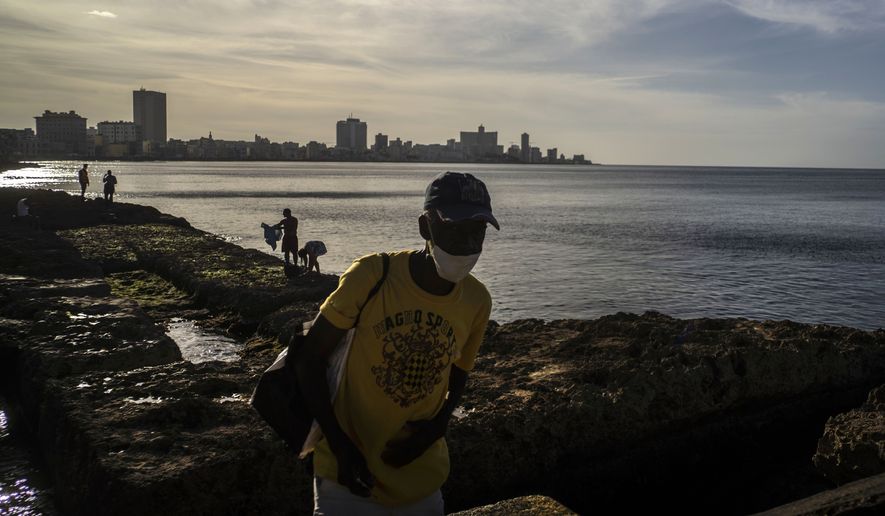The outgoing Trump administration, in one of its last foreign policy acts, is putting Cuba back on the official list of state sponsors of terrorism, reversing an Obama-era decision that aimed to normalize diplomatic relations between the U.S. and the communist island.
Following months of legal procedures, Cuba now joins Syria, Iran and North Korea on the U.S. terror list. The move is likely to complicate efforts by the Biden administration to resume the rapprochement with Havana that the president-elect helped to implement under the Obama administration.
“We will once again hold Cuba’s government accountable and send a clear message: the Castro regime must end its support for international terrorism and subversion of U.S. justice,” Secretary of State Mike Pompeo said in a statement that confirmed multiple rumors that the designation was in the works.
Cuban Foreign Minister Bruno Rodriguez quickly slammed the decision, calling it a “hypocritical and cynical” move made with U.S. electoral considerations in mind. “The political opportunism of this action is recognized by all who have an honest concern about the scourge of terrorism and its victims,” he tweeted.
Mr. Pompeo cited what he said were Cuba’s “support for acts of international terrorism in granting safe harbor to terrorists,” in the decision. U.S. officials said the decision relied heavily on Havana’s ties to Venezuelan socialist President Nicolas Maduro, whom the Trump administration does not recognize as his country’s legitimate leader.
Cuba “broke [its] commitment to stop supporting terrorism as a condition of its removal by the previous administration in 2015,” Mr. Pompeo argued.
As part of the designation, the State Department said it will impose additional of foreign aid to Cuba, ban defense exports and sales and institute other new financial and regulatory restrictions. The U.S. embargo on Cuba was first imposed in 1960 roughly two years after Fidel Castro led a Marxist revolution that overthrew the Cuban government. Cuba was put on the list of state sponsors of terrorism in 1982 by the Reagan administration, which accused the Castro government of supporting violent leftist forces in Latin America and Africa.
President Obama removed Cuba from the list in 2015 despite acknowledgments of ongoing concerns of human rights violations by the Castro government, asserting that such concerns do not warrant keeping Cuba on the terror sponsor list. Mr. Biden vowed on the campaign trail to reverse Trump administration moves that “have inflicted harm on the Cuban people and done nothing to advance democracy and human rights.”
But that stance may have cost him heavily in Florida, where a strong bloc of voters with ties to Cuba and Venezuela are credited with helping Mr. Trump easily carry the state in November.
And reversing the designation could be time-consuming and politically onerous, Emilio Morales, an exiled Cuban economist and president of the Miami-based Havana Consulting Group, told The Associated Press. He predicted it could take the administration at least a year to prepare the legal ground to reverse Monday’s designation. “This will really slow any thaw in relations with the Biden administration,” Mr. Morales told the wire service Monday.
Monday’s move angered a number of key Democrats on Capitol Hill who have supported improving ties with Havana and argued the U.S. embargo has long since outlived its usefulness.
Sen. Patrick Leahy, Vermont Democrat, called the move a “blatantly politicized designation[that] makes a mockery of what had been a credible, objective measure of a foreign government’s active support for terrorism.”
“In fact, domestic terrorism in the United States poses a far greater threat to Americans than Cuba does,” he continued.
The incoming chairman of the House Foreign Relations Committee, Rep. Gregory Meeks, said he is “outraged that Donald Trump is designating Cuba as a state sponsor of terrorism less than a week after he incited a domestic terror attack on the U.S. Capitol.”
“It is essential that the [terror] list be used judiciously to maintain its seriousness and integrity and that a country is never added to the list unless it meets the legal standard,” the New York Democrat said, and urged President-elect Joseph R. Biden to reverse the decision.
The Washington Office on Latin America, a D.C.-based advocacy group, said the Trump administration’s move was “clearly a politically motivated decision, a reward to domestic political allies during the Trump administration during its last weeks, rather than an effective foreign policy step.”
The organization’s president, Geoff Thale, called the move a “vindictive step that will harm Cuban people, and do nothing that genuinely advances human rights or U.S. interests.”
• Lauren Toms can be reached at lmeier@washingtontimes.com.




Please read our comment policy before commenting.